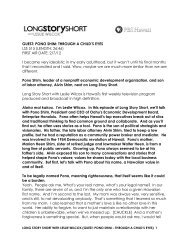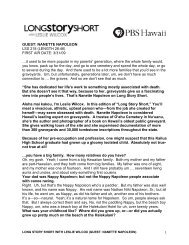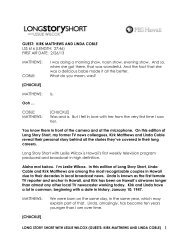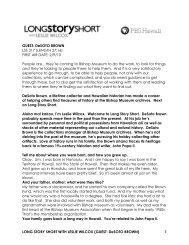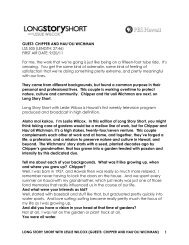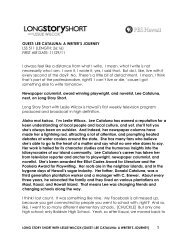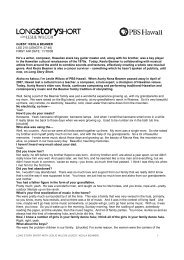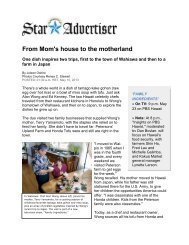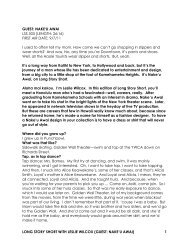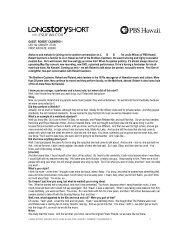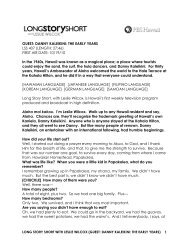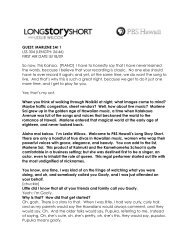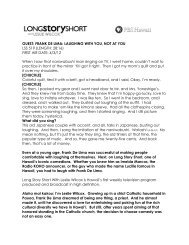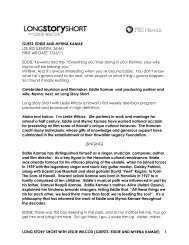long story short with leslie wilcox (guest: shim ... - PBS Hawaii
long story short with leslie wilcox (guest: shim ... - PBS Hawaii
long story short with leslie wilcox (guest: shim ... - PBS Hawaii
You also want an ePaper? Increase the reach of your titles
YUMPU automatically turns print PDFs into web optimized ePapers that Google loves.
GUEST: SHIM KANAZAWA<br />
LSS 604 (LENGTH: 26:16)<br />
FIRST AIR DATE: 9/4/12<br />
It was really a job that was so hard, in a way, because we were dealing <strong>with</strong><br />
mothers of boys who were in war, and husbands in the camps. So much crying,<br />
every day.<br />
Shim Kanazawa, community leader and advocate for <strong>Hawaii</strong> families, next, on<br />
Long Story Short.<br />
Long Story Short <strong>with</strong> Leslie Wilcox is <strong>Hawaii</strong>’s first weekly television program<br />
produced and broadcast in high definition.<br />
Aloha mai kakou, and welcome. We do have to make this <strong>long</strong> <strong>story</strong> <strong>short</strong>, as<br />
our <strong>guest</strong> is ninety-six years old at the time of this conversation, and her life is<br />
way too full to fit into a half hour. Shim Kanazawa is often referred to as the<br />
Florence Nightingale of <strong>Hawaii</strong>. She’s known for her humanitarian efforts during<br />
the last seven decades. During World War II, Shim Kanazawa became the<br />
lifeline for many <strong>Hawaii</strong> Japanese American families torn apart by incarceration<br />
in relocation camps. The Honolulu Consulate of the Swedish Government, which<br />
stayed neutral during the war, hired her in a critical civilian role. She served as<br />
liaison between the Japanese American community and the U.S. military<br />
authorities. In these many years following the war, her volunteer work <strong>with</strong><br />
numerous boards and organizations has led to programs and services that<br />
improved the quality of life for island families. Country girl, Shim Kanazawa, was<br />
born in 1915 in Kamuela on <strong>Hawaii</strong> Island, and raised on Parker Ranch. As the<br />
eldest of eleven siblings, it was assumed that she would remain at home to help<br />
take care of the younger children. It was the unconventional thinking of her<br />
parents, Torazo and Saki Ryusaki, that helped make the way for a much brighter<br />
future.<br />
My parents were very good to us, and they treated us like individuals, and so,<br />
they gave us all the opportunity to do what we wanted to do. And I was very<br />
happy growing up in the big family. And they were poor, but they never<br />
mentioned the financial situation. My father had a garage, and also, a taxi<br />
stand. There were only two taxi stands, and he was one of them. And he was a<br />
very gregarious person and made friends easily. And so, whenever the car<br />
broke down or something, he would invite all of them to the house for dinner or<br />
LONG STORY SHORT WITH LESLIE WILCOX (GUEST: SHIM KANAZAWA) 1
lunch, or whatever. So my mother always had a pot full of some kind of a soup<br />
and rice; she always had that. And so, she was able to feed all of the people<br />
[CHUCKLE] that my father invited. [CHUCKLE] And my mother was a housewife,<br />
and she worked so hard from early morning ‘til night, and really took care of all<br />
of us.<br />
Now, you were on the ranch. What was the connection of the paniolo’s, the<br />
cowboys in your life?<br />
Well, actually, we lived on Parker Ranch, but we didn’t have a Parker Ranch<br />
home. We had our own home. And my father worked on the ranch, but he<br />
was the chauffer for the Parker Ranch nurse too.<br />
How did you all get a<strong>long</strong>, all the eleven kids?<br />
Very well. In fact, I was the eldest, so I thought that after I graduated from<br />
Waimea Elementary School, that maybe I have to take care of one of the<br />
siblings. But my parents said, no, they wanted me to have the best education,<br />
so they sent me to Hilo. And so, I went to Hilo Intermediate School, Hilo High<br />
School, and graduated from the high school.<br />
Who did you live <strong>with</strong>?<br />
Oh, I lived at the Jodo Shu, which is a Buddhist school. Actually, they had a<br />
school and a church, and I was <strong>with</strong> them.<br />
How was that? You were an intermediate school student living <strong>with</strong>out your big<br />
family. What was your life like?<br />
It was so difficult, because Waimea School, maybe there were about twenty,<br />
twenty-five people, all in one room. But Hilo Intermediate, there were about two<br />
hundred fifty or something. And so, I began to stutter. And I stuttered so bad<br />
that I couldn’t face the people when I spoke. I turned my back to them. And I<br />
couldn’t answer the telephone call, because it’s so hard to get that H, hello,<br />
out. But instead of sending me to a nearby school, either Kona or Honokaa, or<br />
Kohala, they wanted the best for me, so they sent me to Hilo.<br />
Did you write to them during the time you were in intermediate and high school<br />
and living away?<br />
No.<br />
No contact?<br />
No, well, once in a while, they used to bring vegetables from Waimea, and<br />
come to Hilo. But otherwise, no contact.<br />
Did you ever say, Take me <strong>with</strong> you, I want to go home?<br />
No. No, I knew that <strong>with</strong> such a big family, that my parents had enough to do.<br />
And so, I had to just stick it out.<br />
You seem like you’re grateful for what some might not be grateful for. I mean,<br />
you didn’t get to live at home starting in intermediate school. You see it as a<br />
great opportunity, because you got a better education.<br />
Yes.<br />
You don’t see it as, I couldn’t live <strong>with</strong> my family.<br />
LONG STORY SHORT WITH LESLIE WILCOX (GUEST: SHIM KANAZAWA) 2
No, no. No, I didn’t. But of course, the siblings missed me, but I can come back<br />
only at Christmas, maybe, and summer. That’s all.<br />
How did you get rid of the stutter?<br />
Mrs. Putnam, who was the vice principal for Hilo High School, she took me under<br />
her wings. And I think she was the one that gave me the confidence, ‘cause I<br />
used to go to the house quite a bit, and I think that’s how I got through <strong>with</strong> my<br />
stuttering. But it was really hard when you stutter. But I got on okay. And my<br />
junior year, my friends got together and they elected me as president of the<br />
senior class.<br />
Immediately following high school, Shim Kanazawa worked at Big Island public<br />
schools, and was later promoted to the Department of Education’s Vocational<br />
Division in Honolulu. As <strong>with</strong> everyone in <strong>Hawaii</strong>, Shim Kanazawa’s life was<br />
transformed <strong>with</strong> Japan’s attack on Pearl Harbor and the martial law that<br />
followed. The Queen’s Hospital, which bore the brunt of caring for the civilian<br />
war casualties, was administered by Gustav Olsen, who also served as the Vice<br />
Consul of Sweden. Hard pressed, he needed assistance administering to<br />
<strong>Hawaii</strong>’s demoralized Japanese community, and set out to hire a liaison<br />
between that community and the U.S. military. Shim Kanazawa was<br />
recommended as someone who possessed the unique qualifications to fill the<br />
job.<br />
She must speak Japanese, but more important, I want a girl <strong>with</strong> a Red Cross<br />
heart.<br />
A Red Cross heart.<br />
And so, he me sight unseen. He didn’t even see me. And so, that’s how I had<br />
this job at the Swedish Vice Consulate.<br />
And the way the consulate of Sweden became involved was, they were a<br />
neutral party during the war, and they were assigned to take care of, quote,<br />
Japanese interests.<br />
That’s right.<br />
So, you were in a very influential position.<br />
Yeah.<br />
You got to circulate among high up U.S. military, and disillusioned and<br />
discouraged Japanese families who’d been broken up by war, and distrusted by<br />
their own government.<br />
I was a liaison between the military government and the civilian population of<br />
Japanese. And so, I was given a pass that I could go anywhere, anytime, and<br />
be one of those that would have the priority. And so, it was really a job that was<br />
so hard, in a way, because we were dealing <strong>with</strong> mothers of boys who were in<br />
war, and husbands in the camps. I had to go down to the Military Intelligence<br />
Office and find out why the husbands were taken away, and the parents would<br />
come crying on our shoulders because they don’t know what to do. We cry<br />
<strong>with</strong> them too, and they want to tell me what they think even about their own<br />
LONG STORY SHORT WITH LESLIE WILCOX (GUEST: SHIM KANAZAWA) 3
family. And so, sometimes when the sons come to the office, and then try to get<br />
information, and I think to myself, Your mother was here and told me about you.<br />
[CHUCKLE] But I never tell them anything, and I keep everything to myself.<br />
That’s the hardest thing. All the data of the family, that is given out. But<br />
anything else, I kept it to myself. So it makes it hard for me. But, so much crying,<br />
every day.<br />
And you’re a problem solver, and you couldn’t solve all those problems. You<br />
could just give empathy and give whatever official support there was.<br />
Yeah. I had to get some jobs for the wives too. And so, I had a friend who had<br />
an aloha shirt factory, and so I would get parts, like the sleeve or the front or<br />
back, or something, by pieces, and give them to sew that part. Because the<br />
wives of the ministers and all of that, they never had experience of sewing or<br />
anything like that. So I had to give them pieces.<br />
And you know that you were often referred to as the Florence Nightingale of<br />
<strong>Hawaii</strong>. What do you think of that?<br />
Well, that’s when I took that group of internees, there were about thirty of them,<br />
to Crystal City, Texas, to meet their families. And the submarine was still lurking<br />
around, and it was really a very scary experience. I had to leave them at the<br />
gate, because they wouldn’t allow us to go inside. And that’s when the<br />
National Red Cross and the Swedish government and the military gave me a trip<br />
to travel through thirty-seven states. And I did that in three months. [CHUCKLE]<br />
So it was a perk, it was a vacation for you after all the work you did in the war?<br />
Yeah. I stayed at the Romanian Embassy. When I traveled to different places,<br />
the military officers clubs took care of me.<br />
And you were traveling alone?<br />
I was traveling alone. And I never traveled before, and for me to get on the<br />
train was a new experience. And so someone said on the way, How come you<br />
travel <strong>with</strong> your head up high? And he says, You’re not like the other internee<br />
families, because they would be afraid to walk <strong>with</strong> their head up.<br />
Did you feel racism? Did you experience racism?<br />
No, nothing. In fact, Mr. Alfred Carter, who was the ranch manager, he was<br />
down at the office to take a plane back to Kamuela. And I said, Mr. Carter,<br />
you’re going on this plane, why don’t you go, because I can go on the next<br />
plane. He said, No. He said, To have you, as a young Japanese girl to have this<br />
opportunity to take care of the people, he says, I want you to go.<br />
You were very young to be doing that job, weren’t you?<br />
I was about twenty-six. Yeah.<br />
And dealing <strong>with</strong> life and death, and everything in between, the worries of war.<br />
Yeah.<br />
That must have influenced you as a person in your later life. How do you think<br />
you changed as a result of that experience?<br />
Well, to me, it was something that I always do anyway. I like to deal <strong>with</strong><br />
people, to make them happy.<br />
LONG STORY SHORT WITH LESLIE WILCOX (GUEST: SHIM KANAZAWA) 4
Besides the all expenses paid trip through thirty-seven states in three months,<br />
Shim Kanazawa also received recognition by the national office of the<br />
American Red Cross for her meritorious performance during World War II.<br />
Returning home after the war, she went to work for the Veterans Administration<br />
and set her sights on traveling to Tokyo, to work <strong>with</strong> the American Embassy.<br />
Another unforeseen force caused a change of plans, when Shim Ryusaki, as she<br />
was then known, was pursued by Kinji Kanazawa. Kinji was a community<br />
organizer credited <strong>with</strong> saving the Moiliili Community Center, formerly known as<br />
the Moiliili Japanese Language School, from government confiscation during<br />
World War II.<br />
He had a twin brother who was one of the officers in the Veterans<br />
Administration, so I thought he was coming to see him. But no, one of the<br />
secretaries knew him and told him, Come, I want you to meet a girl from the<br />
country. [CHUCKLE] And so, that’s how we met. He would come and try to talk<br />
to me, and I said, No, no, I’m not interested. And he would invite me to other<br />
functions, and I said, No, I don’t want to go. Until one of the girls who worked<br />
<strong>with</strong> me knew him and said, You come and see me. And so, he went to see her,<br />
and that’s how she introduced me to Kinji. [CHUCKLE]<br />
You already knew him, but then she introduced you?<br />
Yeah, yeah. Yeah.<br />
Now, at that time, most women were channeled into marriage.<br />
Yeah.<br />
And weren’t looking to go to another country for a job assignment.<br />
Yeah, yeah.<br />
So you were unusual.<br />
Yeah. [CHUCKLE]<br />
And you didn’t even let him down easy. You said, I don’t want to do that.<br />
No. [CHUCKLE]<br />
You didn’t say, I’d love to some other time, no, no, no.<br />
Yeah.<br />
What was the connection between you, do you think?<br />
He was so good to me, and he had the same kind of feeling that I had for<br />
people. He would do anything for the sake of helping people.<br />
Shim and Kinji Kanazawa moved to Boston <strong>short</strong>ly after their marriage. Kinji took<br />
part in an accelerated law program for two years at Boston College. Shim<br />
attended the Chamberlain School of Retailing, and later worked in stores <strong>with</strong><br />
the hope of someday opening a bridal shop. Upon the couple’s return to<br />
<strong>Hawaii</strong>, Shim went to work instead at Sears, McInerny, and Liberty House. She<br />
later taught retail training at various public high schools. A<strong>long</strong> the way, she<br />
and Kinji raised son Sidney, and daughter Joanie. For the past fifty years, Shim<br />
Kanazawa has spent countless volunteer hours on boards and commissions. She<br />
was the first Nisei woman on the board of Aloha United Way, and the first woman<br />
LONG STORY SHORT WITH LESLIE WILCOX (GUEST: SHIM KANAZAWA) 5
director and chair of the board of Kuakini Medical Center. She was the driving<br />
force who brought about the State Executive Office on Aging, and she was<br />
appointed to the National Advisory Committee on Aging by President Carter.<br />
Project Dana, an interfaith program, is an example of one of her many<br />
pioneering efforts to assist and advocate for <strong>Hawaii</strong>’s kupuna.<br />
Project Dana is helping people, especially those who want to stay in their own<br />
place, to help the elderly to remain in their place that they want to stay as <strong>long</strong><br />
as possible. The person who really does that in Honolulu is Mrs. Rose Nakamura.<br />
And she is the one that <strong>with</strong> a very small office help, is able to carry on this big<br />
job that she has. And for her to do that as a volunteer is something very special.<br />
You’ve served under five governors in the aging field. How <strong>long</strong> are you going<br />
to keep serving in the Executive Office of Aging?<br />
I’m still there. I go once a month to a meeting, because when Governor<br />
Cayetano made the proclamation, he said that I go to the meeting, but don’t<br />
miss a meeting. [CHUCKLE]<br />
You’ve been doing this active participation ever since the days of Governor Bill<br />
Quinn.<br />
Yeah. I thought I was going back to school, University. But Governor Quinn<br />
made me chair, the Family Life and Law Committee <strong>with</strong> Judge Betty Vitousek<br />
as vice-chair. So she and I worked <strong>with</strong> the legislators, and then we were<br />
instrumental in getting the Family Court System of <strong>Hawaii</strong>. So I never went back<br />
to the University. But the University gave me a …<br />
Honorary Doctor of Humane Letters Degree.<br />
Yeah. They gave me that.<br />
I would say so. I mean, look at what you’ve done. When you look back at your<br />
life, I mean, you look back at the span of your life and the things you’ve done,<br />
your particular special role during martial law, helping to start Family Court in<br />
<strong>Hawaii</strong>, pioneering work <strong>with</strong> aging, what do you think? As you look back, what<br />
do you think of your life?<br />
When my daughter and my son are together, I thought I’ll tell them that when I<br />
pass on [CHUCKLE] to have different people do different things for me.<br />
[CHUCKLE]<br />
You mean, take up the role you’ve played? But you need more than one<br />
person to do all this stuff.<br />
No, no, no. [CHUCKLE]<br />
So you want to just make sure that the work keeps going on?<br />
That’s it.<br />
So you’ve never really retired up here; right?<br />
No. No.<br />
Will you ever?<br />
I don’t think so. I think I will always be doing things for other people.<br />
What’s the toughest thing about aging, from your perspective, right now?<br />
LONG STORY SHORT WITH LESLIE WILCOX (GUEST: SHIM KANAZAWA) 6
I think we need more people to really look at aging, and to give them, I think,<br />
more than just recreation. Education and other things, so that the older people<br />
stay occupied and maybe … keep themselves young.<br />
You have no trouble keeping yourself young.<br />
No.<br />
How do you do it?<br />
So far, I’ve been very happy, because I have a wonderful family, and my<br />
grandchildren are doing very well now, and my friends are all so good to me.<br />
And I think all of that makes my life very easy.<br />
Why do you think you’re so positive?<br />
Maybe I’m not that kind of a person that worries too much. Because whatever<br />
happens, it happens.<br />
What’s the best piece of advice you’ve ever given to a friend or family member?<br />
Be yourself, and do good to others.<br />
At the time this conversation was taped in 2012, Shim Kanazawa was about to<br />
turn ninety-seven. Named a Living Treasure of <strong>Hawaii</strong> by the Honpa Hongwanji<br />
Mission of <strong>Hawaii</strong>, she continues to serve and honor her island community.<br />
Thank you, Shimeji Kanazawa, for sharing your Long Story Short. And thank you<br />
for watching and supporting <strong>PBS</strong> <strong>Hawaii</strong>. I’m Leslie Wilcox. A hui hou kakou.<br />
For audio and written transcripts of this program, and all episodes of Long Story<br />
Short <strong>with</strong> Leslie Wilcox, visit pbshawaii.org.<br />
There’s nothing in your remembrances about anger, hostility, bad people?<br />
No.<br />
Cruelty?<br />
No. All of my friends and my family, and everybody, has been really extra<br />
special to me. And I really appreciate all of that.<br />
You must encounter people who are rude, have ulterior motives, but you don’t<br />
take it to heart?<br />
No. No; I just turn them around. [CHUCKLE]<br />
You turn them around; how do you do that? I’d like to know that skill. How do<br />
you do it?<br />
I just look at the good side of them, and try to make them come a<strong>long</strong>.<br />
LONG STORY SHORT WITH LESLIE WILCOX (GUEST: SHIM KANAZAWA) 7



